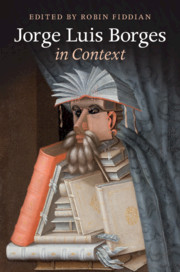Book contents
- Jorge Luis Borges in Context
- Jorge Luis Borges in Context
- Copyright page
- Contents
- Illustrations
- Contributors
- Acknowledgements
- Permissions
- Note on Primary Sources and Editions Used
- Chronology
- Note on Translations and Abbreviations
- Introduction Borges in Context, Context in Borges
- Part I Self, Family, and the Argentine Nation
- Part II The Western Canon, the East, Contexts of Reception
- Chapter 17 Borges and Cervantes
- Chapter 18 Borges’s Shakespeare
- Chapter 19 Borges and the Dialectics of Idealism
- Chapter 20 The English Romantics and Borges
- Chapter 21 Borges and the First Spanish Avant-Garde
- Chapter 22 Borges and James Joyce: Makers of Labyrinths
- Chapter 23 Borges and Kafka
- Chapter 24 Borges and the Bible
- Chapter 25 Borges and Judaism
- Chapter 26 Borges and Buddhism
- Chapter 27 Borges and Persian Literature
- Chapter 28 Borges and the ‘Boom’
- Chapter 29 Argentina and Cuba: The Politics of Reception
- Chapter 30 Borges and Coetzee
- Chapter 31 Borges in Portugal
- Chapter 32 Borges and Italy
- Further Reading
- Index
Chapter 31 - Borges in Portugal
from Part II - The Western Canon, the East, Contexts of Reception
Published online by Cambridge University Press: 16 January 2020
- Jorge Luis Borges in Context
- Jorge Luis Borges in Context
- Copyright page
- Contents
- Illustrations
- Contributors
- Acknowledgements
- Permissions
- Note on Primary Sources and Editions Used
- Chronology
- Note on Translations and Abbreviations
- Introduction Borges in Context, Context in Borges
- Part I Self, Family, and the Argentine Nation
- Part II The Western Canon, the East, Contexts of Reception
- Chapter 17 Borges and Cervantes
- Chapter 18 Borges’s Shakespeare
- Chapter 19 Borges and the Dialectics of Idealism
- Chapter 20 The English Romantics and Borges
- Chapter 21 Borges and the First Spanish Avant-Garde
- Chapter 22 Borges and James Joyce: Makers of Labyrinths
- Chapter 23 Borges and Kafka
- Chapter 24 Borges and the Bible
- Chapter 25 Borges and Judaism
- Chapter 26 Borges and Buddhism
- Chapter 27 Borges and Persian Literature
- Chapter 28 Borges and the ‘Boom’
- Chapter 29 Argentina and Cuba: The Politics of Reception
- Chapter 30 Borges and Coetzee
- Chapter 31 Borges in Portugal
- Chapter 32 Borges and Italy
- Further Reading
- Index
Summary
A sculpture of a golden hand in one of the busiest districts in Lisbon is a memorial meant to invoke Borges’s Portuguese origins - about which he wrote a poem, ’Los Borges’. Borges possessed extensive knowledge of Portuguese culture and was willing to use that knowledge to locate himself as part of European universalizing traditions. His knowledge ranged over Luis de Camões, Antero de Quental, Eça de Queiros, et al. He wrote a sonnet, ’A Camões’ and an essay on his work. Elsewhere, he claimed that his Portuguese lineage enabled him to grasp Pessoa’s writing more thoroughly. Saramago drew inspiration from Borges and imbued the Argentine writer’s tropes with a progressive slant. Borges’s influence also extends to the visual arts of Portugal and is present in a recent (2017) work of Portuguese fiction.
- Type
- Chapter
- Information
- Jorge Luis Borges in Context , pp. 252 - 258Publisher: Cambridge University PressPrint publication year: 2020

